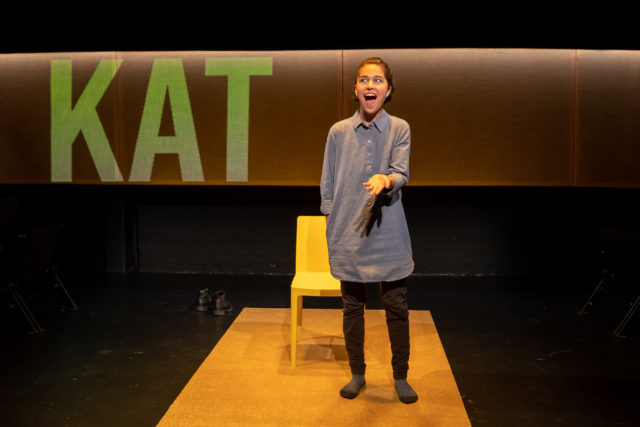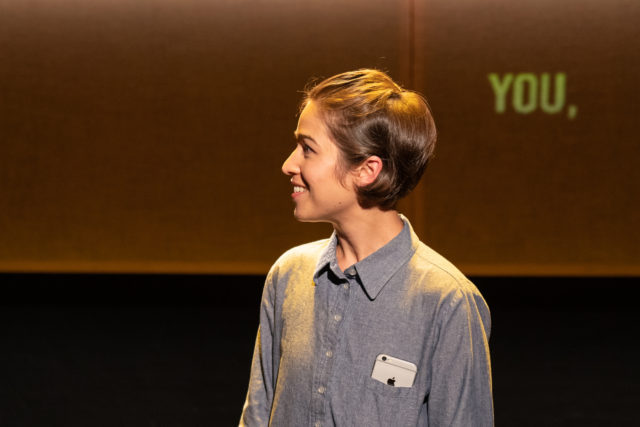
Xandra Nur Clark wrote and stars in one-person show about ethical nonmonogamy (photo by Ashley Garrett)
HERE Arts Center
145 Sixth Ave.
In person through October 9, $40
On-demand streaming through October 13, $20-$25
here.org/shows
www.polyloguesplay.com
A few years ago, a friend of mine told me that his girlfriend had just explained to him that she was polyamorous. I had not heard that term before, and he wasn’t quite sure what it meant either, but it wasn’t merely that his partner wanted an open relationship so she could see other people. It went well beyond that.
Writer and performer Xandra Nur Clark explores the reality of polyamory in the insightful one-person show, Polylogues. The seventy-five-minute piece of documentary theater has just finished its run at HERE Arts Center and is available on demand through October 13. Clark, a queer Indian American community builder who studied with Anna Deavere Smith, interviewed more than fifty people over three years about ethical nonmonogamy, ranging in age from five to seventy-five, from eleven different countries and numerous races, religions, socioeconomic backgrounds, and political perspectives. Clark wears earphones during the Colt Coeur production, listening to the actual words spoken by the subjects and enacting them for the audience, which sits on three sides of Clark, who doesn’t do a deep dive into each character but embodies them with small differences in tonality and gestures. The characters are either the one who initiated the idea of nonmonogamy in the relationship, the one who was asked to consider it, or had nonmonogamous parents. In some cases they are happy with their decision to participate, but in others it either goes awry or they appear to be trying too hard to defend and rationalize their choices.
Ryan points out, “I’m not behaving like a quote unquote normal person would behave in this situation.” Shamma offers, “When you spend your whole life as a cheater, right? You’re doing it to fulfill a certain insecurity that you have in the, you know, a gap that you have in the relationship?
So you go to the next person to fill that gap. . . . Why can’t this be a new form of family?!” Trudy refers to the additional person as a “love friend.”
Casius says, “Most people think polyamory is just like about having orgies! . . . It’s like being willing to do anything for another person no matter what!” Jackson declares, “You know, I’m not a fucking toy! You know, like, I’m a person. And it’s not that we couldn’t have made a very casual arrangement, but, like, I need to have some autonomy in that decision!”
K, a Muslim from Malaysia, where men can have multiple wives, asserts, “Nonmonogamy interacting with male privilege, or interacting with capitalism, can, like, produce some really, like, frightening dynamics. . . . And finding ways to self-limit that in my nonmonogamy practice is . . .
important to me. To ensure I’m not trying to . . . I don’t know, like, build a . . . mmm, I don’t know . . . build a harem or something.”

Xandra Nur Clark embodies multiple characters involved in polyamorous relationships (photo by Ashley Garrett)
The issue of jealousy comes up numerous times. Alex admits, “I’m not okay with him with another girl other than his wife, but I’m okay with him with his w-wife. I want it — this one, this one guy love me with his full heart, everything. But meanwhile, I still got freedom to choose someone else!” And CJ concedes, “I’m fine with being with one person. But I always want to make sure that the other person doesn’t feel an obligation to me. I don’t want you to feel like you’re stuck with me.” She later adds, “It’s just like,
well, I’ll just — if this is just a little piece of it, I can get through nonmonogamy, I’ll take this little piece. Or like, if we’re ‘n a . . . nonmonogamous relationship, you can’t break my heart. But, maybe I just equate breaking my heart with cheating on me.”
Directed by Molly Clifford (Karaoke, Soldier), who introduces the piece in a clever way that prepares everyone for what is to follow, Polylogues begins with a stream of questions and statements on the wall behind Clark, including the key one: “How do you experience love in your life?” Clark (Everything You’re Told, Separated) is charming as she embodies the diverse characters, displaying a relaxing demeanor that brings ease and comfort to an audience that most likely doesn’t understand the complexities of modern-day ethical nonmonogamy, a term I had not encountered until seeing this show. You’re likely to be enticed by the play, if not polyamory itself, although I’m not sure my friend is ready to hear more about it just yet.